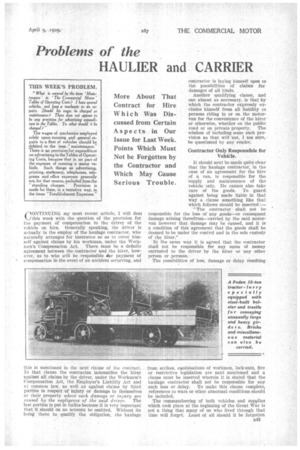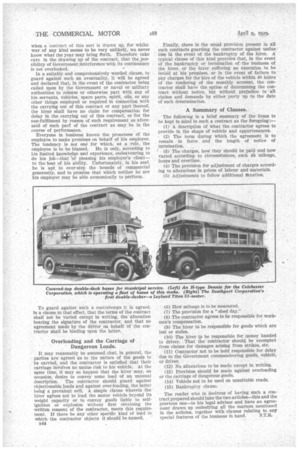Problems of the HAULIER and CARRIER
Page 69

Page 70

If you've noticed an error in this article please click here to report it so we can fix it.
CIONTINUING my most recent article, I will deal ‘..J this week with the question of the provision for the payment of compensation to the driver of the vehicle on hire. Generally speaking, the driver is actually in the employ of the haulage contractor, who naturally arranges for insurance so as to cover himself against claims by his workman, under the Workmen's Compensation Act. There must be a definite agreement between the contractor and the hirer, however, as to who :will be responsible ior payment of compensation in the event of an accident occurring, and t us is mentioned in the next clause of the contract. In that clause the contractor indemnifies the hirer against all claims by the driver, under the Workmen's Compensation Act, the Employer's Liability Act and at common law, as well as against claims by third parties in respect of injury or damage to themselves or their property where such clantage or injury are caused by the negligence of the said driver. The last portion is put in italics because it is very important that it should on no account be omitted: Without its being there to qualify the obligation, the haulage
contractor is laying himself open to the possibilities of claims for damages of all hinds.
Another qualifying clause, and one almost as necessary, is that by which the contractor expressly excludes himself from all liability to persons riding in or on the motorvan for the convenience of the hirer• or otherwise, whether on the public road or on private property. The wisdom of including sonic such provision as that will 'not, I am sure, be questioned by any reader.
Contractor Only Responsible for Vehicle.
It should next be made quite clear that the haulage contractor, in the case of an agreement for the hire of a van, is responsible for the supply and maintenance of the vehicle only. He cannot also take care of the goods. To guard against being made liable in that way a clause something like that Which follows should be inserted :—
" The contractor shall pot be responsible for the loss of any goods—or consequent damage arising therefrom—carried by the said motorvan however that damage may be caused, and it is a condition of this agreement that the goods shall be deemed to be under the control and in the sole custody of the hirer."
in The seine way it is agreed that the contractor shall not be responsible for any sums of money entrusted to the driver by the hirer or any other person or _persons.
The possibilities of loss, damage or delay resulting from strikes, cpmbinations of workmen, lock-outs, fire or restrictive legislation are next mentioned and a clause must be inserted wherein it is stated that the haulage contractor shall not be responsible for any such loss or delay. To make this clause complete, references to wars or other abnormal conditions should be included.
The -commandeering of both vehicles and supplies which took place at the beginning of the Great War is not a thing that many of us who lived through that time will forget. Least of all should it be forgotten
when a contract of this sort is drawn up, for whilst war of any kind seems to be very unlikely, we never know what the year may bring forth. Therefore take care in the drawing up of the contract, that the_possibility of Government interference with its continuance is not overlooked. * In a suitably and comprehensively worded clause, to guard against such an eventuality, it will be agreed and declared that, in the event of the contractor being called upon by the Government or naval or military authorities to release or otherwise part with any of his servants, vehicles, spare parts, spirit, oils, or any other things employed or required in connection with the carrying out of this contract or any part thereof, the hirer shall have no claim for compensation for delay in the carrying out of this contract, or for the non-fulfilment by reason of such requirement as aforesaid of such part of the contract as may be in the course of performance.
Everyone in business knows the proneness of the employee to make promises on behalf of his employer. The tendency is not one for which, as a rule, the employee is to be blamed. He is only, according to his limited knowledge and experience, endeavouring to do his job—that of pleasing his employer's client— to the best of his ability. Unfortunately, in his zeal. he is apt to over-step the bounds of commercial generosity, and to promise that which neither he nor his employer may be able economically to perform.
To guard against such a contretemps it is agreed. in a clause to that effect, that the terms of the contract shall not be varied except in writing, the alteration bearing the signature of the contractor, and that no agreement made by the driver on behalf of the contractor shall be binding upon the latter.
Overloading and the Carriage of • Dangerous Loads.
It may reasonably be assumed that, in general, the parties are agreed as to the nature of the goods to be carried, and the contractor is satisfied that their carriage involves no undue risk to his vehicle. At the same time, it may so happen that the hirer may, on occasion, desire to convey some load of an unusual description. The contractor should guard against objectionable loads and against over-loading, the latter being a prevalent evil. A simple clause wherein the hirer agfees not to lead the motor vehicle beyond its weight capacity or to convey goods liable to selfignition or explosion without first Obtaining the written consent of the contractor, meets this requirement. If there be any other specific kind of lead to which the contractor objects it should be named.
B44
Finally, there is the usual provision present in all such contracts guarding the contractor against undue loss in the event of the bankruptcy of the hirer. A typical clause of this kind provides that, in the event of the bankruptcy or termination of the business of the hirer, or the hirer suffering an execution to be levi&I at his premises, or in the event of failure to pay charges for the hire of the vehicle within 48 hours of the rendering of the monthly account, the contractor shall have the option of determining the contract without notice, but without prejudice to all claims and demands by either party up -to the date of such determination.
A Summary of Clauses.
The following is a brief summary of the items to be kept in mind in such a contract as the foregoing:— (1) 'A description of what the contractor agrees to provide in the shape of vehicle and appurtenances.
(2) The term during which the agreement is to remain in force and the length of notice of termination.
(3) The charges, how they should be paid and how varied according to circumstances, such tis mileage, hours and overtime.
(4) The provision for adjustment of charges according to alterations in prices of labour and materials.
(5) Adjustments to follow additional taxation.
(6) How mileage is to be measured.
(7) The provision for a "shed day."
(8) The contractor agrees to be responsible for workmen's compensation.
(9) The hirer to be responsible for goods which are lost or stolen.
(10) The hirer to be responsible for money handed to driver. That the contractor shoal(' be exempted from claims for damages arising from strikes, etc.
(11) Contractor not to be held responsible for delay due to the Government commandeering goods, vehicle, or driver.
(12) No alterations to be made except in writing.
(13) Provision should be made against overloading or the carriage of dangerous goods.
(14) Vehicle not to be used on unsuitable roads.
(15) Bankruptcy clause.
• The reader who is desirous of having such a contract prepared should take the two articles—this and the previous one—to his legal adviser and have an agreement drawn up embodying all the matters mentioned in the articles, together with clauses relating to any special features of the business in hand. S.T.R.




















































































































